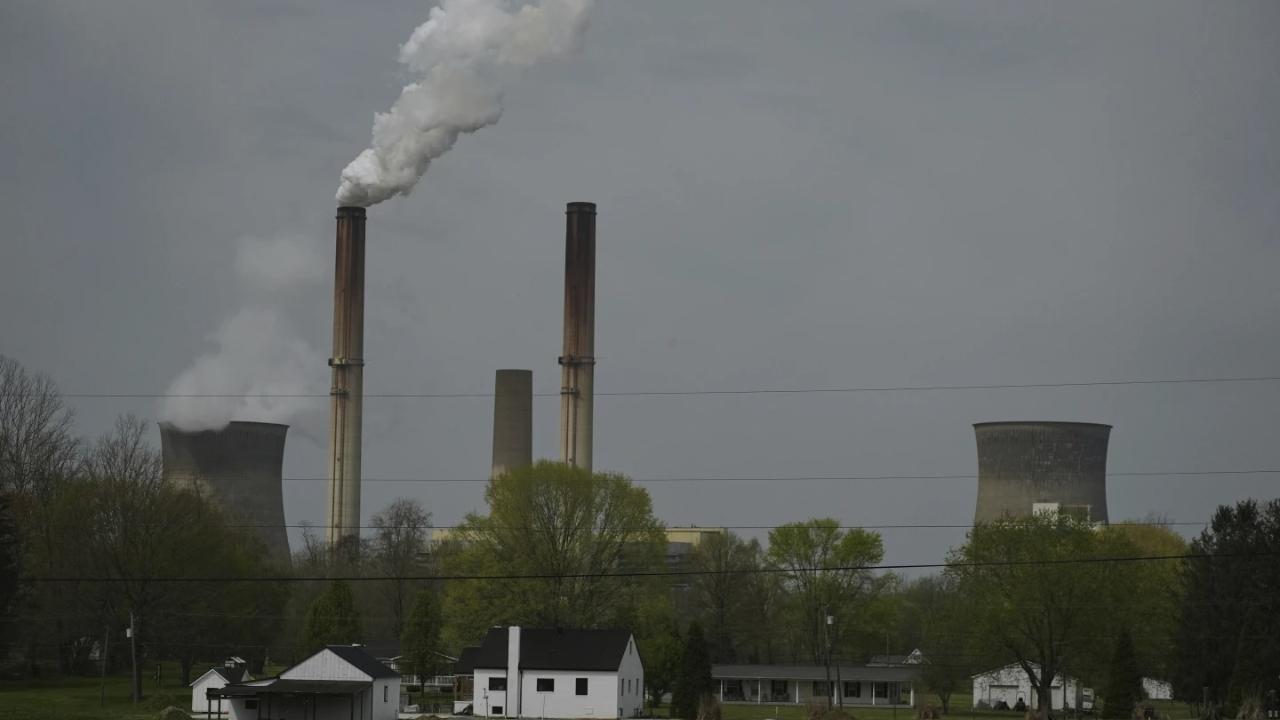
Post by : Monika
Photo: AP
The U.S. Environmental Protection Agency (EPA), led by Administrator Lee Zeldin, has proposed revoking a key scientific finding from 2009, known as the "endangerment finding." This finding determined that greenhouse gases, such as carbon dioxide,
pose a threat to public health and welfare. The proposal aims to remove the legal basis for several environmental regulations designed to limit emissions from vehicles, power plants, and other sources.
In response, the National Academy of Sciences (NAS), an independent body advising the government on scientific matters, has strongly opposed the EPA's move. The NAS reaffirmed that climate change is a significant and growing threat to public health, citing extensive and increasingly conclusive evidence since 2009.
The NAS's Reaffirmation
The NAS emphasized that human activities are releasing greenhouse gases that are warming the planet, leading to more extreme temperatures and changes in the oceans. These developments pose serious risks to the health and welfare of the U.S. public.
The evidence supporting this conclusion has only strengthened over time, with new data showing intensified wildfires, rising sea levels, and increased health risks due to extreme weather and air pollution.
The NAS also addressed specific claims made by the Trump administration. For instance, the administration suggested that U.S. wildfires are not more common than in the past. However, the NAS provided evidence that climate change has worsened wildfires, with earlier springs, longer dry summers, and cumulative droughts lengthening the fire season and increasing the likelihood of large, fast-spreading fires, especially in the West.
Regarding rising sea levels, the NAS pointed out that the administration relied on limited data from a few tidal stations. In contrast, comprehensive data from multiple stations and satellites show strong evidence that sea levels are accelerating.
Criticism of the EPA's Proposal
Scientists have widely criticized the EPA's proposal to revoke the endangerment finding. Many argue that the administration's reports misuse or misinterpret scientific data to downplay the severity of climate change. For example, some reports have been accused of cherry-picking data or ignoring key studies that highlight the dangers of greenhouse gas emissions.
Experts warn that removing the endangerment finding could lead to the rollback of important regulations aimed at reducing emissions and protecting public health. Such actions may hinder efforts to combat climate change and its associated health risks, including respiratory problems, heat-related illnesses, and the spread of infectious diseases.
Legal and Environmental Implications
The endangerment finding serves as the legal foundation for various environmental regulations under the Clean Air Act. If revoked, these regulations could be weakened or eliminated, potentially leading to increased emissions and greater public health risks.
Environmental groups and legal experts have expressed concern that such actions could violate the Clean Air Act's mandate to protect public health and welfare.
Additionally, the rollback of climate regulations could undermine international efforts to address global warming. The United States' commitment to reducing greenhouse gas emissions plays a crucial role in global climate agreements, and weakening domestic policies may diminish the country's credibility and leadership on the world stage.
Public Response and Legal Challenges
The proposed revocation of the endangerment finding has sparked widespread public concern and opposition. Environmental organizations, health advocates, and concerned citizens have mobilized to challenge the EPA's actions. Legal challenges are expected, with plaintiffs arguing that the EPA's proposal contradicts established scientific evidence and violates statutory requirements to protect public health.
Public comments on the proposal are being solicited, allowing individuals and organizations to voice their opinions and concerns. This process provides an opportunity for the public to engage in the decision-making process and influence the outcome of the proposed rule.
The EPA's proposal to revoke the 2009 endangerment finding has ignited a significant debate over the role of science in shaping environmental policy. While the administration argues that removing the finding will reduce regulatory burdens, the NAS and numerous scientists assert that climate change poses undeniable risks to public health and welfare.
The outcome of this debate will have profound implications for future environmental regulations and the United States' commitment to addressing climate change.










NBA Friday Recap: Powerhouse Wins for Miami, LA, Milwaukee, and Clippers
Miami, LA Lakers, Milwaukee, and Clippers triumphed in a thrilling NBA Friday, showcasing standout p

Doncic Shines with 49 Points in Lakers' 128-110 Victory over Timberwolves
Luka Doncic dazzles with 49 points as the Lakers secure a 128-110 win against the Timberwolves, show

Kings Triumph Over Jazz 105-104 with Last-Minute Sabonis Effort
The Sacramento Kings edged out the Utah Jazz 105-104, with Domantas Sabonis making the decisive shot

Argentina's Friendly Match Against India Delayed, New Date to be Announced
The friendly match between Argentina and India in Kochi has been postponed due to FIFA approval dela

Rohit and Kohli Conclude ODI Journeys in Australia with a Victory
Rohit Sharma and Virat Kohli bid adieu to Australian ODIs with a final win, forming a 168-run partne

George Russell's Wrestling Mask Antics at Mexican Grand Prix
George Russell donned a wrestling mask to enjoy the Mexican Grand Prix from the stands, providing a